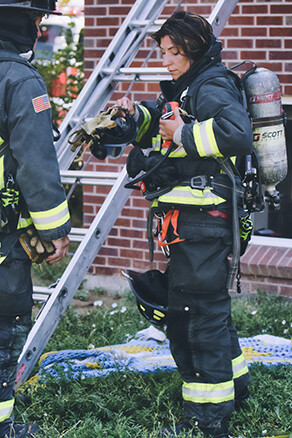What are presumptive injuries and illnesses?
In California’s workers’ compensation process, special presumptive laws shift the burden of proof from employees to employers when workers suffer an injury while on the job. Presumptive means that it is the legal responsibility of the employer, not the employee, to prove or disprove that their worker’s injuries are work-related when they file for compensation. In some work classifications, injuries are presumed to be acquired from work undertaken for that specific classification.
Presumptive Injuries for California Police Officers and Firefighters
 The most common presumptive injuries for police officers and firefighters are cancer and heart problems. Cancer, for instance, can have many known or unknown causes. However, in specific occupations like firefighters or police officers, these individuals are exposed to cancer-causing substances more than the average worker. The law allows these specific classifications a legal presumption that their injury or illness is work related. The intended purpose of presumption is designed to lessen the burden for the injured worker and make it easier for them to prove that their injury or illness is work-related. Recently, California has passed workers’ compensation legislation in response to Covid. This legislation grants unique presumptive benefits for high-risk occupations such as police officers, paramedics, and healthcare workers. This recent legislation allows these high-risk workers who have a greater risk of contracting Covid while on the job than other occupations the presumption that their illness is work-related.
The most common presumptive injuries for police officers and firefighters are cancer and heart problems. Cancer, for instance, can have many known or unknown causes. However, in specific occupations like firefighters or police officers, these individuals are exposed to cancer-causing substances more than the average worker. The law allows these specific classifications a legal presumption that their injury or illness is work related. The intended purpose of presumption is designed to lessen the burden for the injured worker and make it easier for them to prove that their injury or illness is work-related. Recently, California has passed workers’ compensation legislation in response to Covid. This legislation grants unique presumptive benefits for high-risk occupations such as police officers, paramedics, and healthcare workers. This recent legislation allows these high-risk workers who have a greater risk of contracting Covid while on the job than other occupations the presumption that their illness is work-related.
Salary Continuation – Labor Code 4850
While on a leave of absence or if permanently disabled as the result of a work-related injury. Specific occupations of firefighters and police officers are compensated a whole year’s salary for up to one year per labor code 4850. In some instances, if an individual is still tentatively disabled or unable to work as a result of their injuries even after the expiration of labor code 4850, the injured worker is entitled to temporary workers’ compensation benefits.
Eligible Occupations
Below is a list of eligible occupation recipients for labor code 4850:
- Police officers
- firefighters
- sheriffs
- inspectors
- investigators
- detectives
- probation officers
- peace officers
- lifeguards
- airport police
- port/harbor police
- Los Angeles school district police
Presumptive Justice for Public Safety Employees
California public safety officers such as firefighters and police officers are entitled to an advantage when proving particular work injuries as enumerated in Labor Code Sections 3212 through 3213. Certain types of public safety officers may be excluded from these presumptions depending on the specific penal code that applies to their job.
Apportionment
Apportionment is the splitting up of personal disability for industrial and non-industrial disability. In 2006 the state legislator amended and refined Labor Code Section 4663 in presumption cases. The standard is that once a worker establishes an injury in a presumption case per the Labor Code Sections mentioned above, there can be no apportionment to a preexisting disability or condition.
Retirement Concerns & Pension/Disability
Issues often arise with retirement, pension, and disability when an employee acquires a work-related illness or injury. It’s essential to understand the many different retirement plans and their corresponding potential complications with workers’ compensation claims. It’s extremely important to consult a qualified workers’ compensation attorney to ensure that potential benefits are not lost.
Death Benefits
Per labor code section 4700, death to an employee that occurred out of and in the course of their employment entitles partial and total dependents of the deceased to a monetary workers’ compensation death benefit. Labor Code section 4709 awards children that are dependents of peace officers if they die or are permanently disabled while on duty. Labor Code Section 4856 allows for continued health benefits for the surviving spouse or dependents of deceased peace officers or firefighters. If a peace officer or firefighter dies while on duty, their surviving spouse and their children, who are still under age 18, continue to access that same healthcare coverage that was active at the time of their death.
Illnesses and Injuries Related to Labor Code 3212
- Back problems
- Hernia
- Heart trouble
- Pneumonia
- Cancer
- Tuberculosis
- Bloodborne infectious diseases
- Bio-hazard Exposure
- Meningitis
California Executive Order N-62-20
On May 6, 2020, California Governor Gavin Newsom issued an executive order that created a rebuttal presumption, stating that Covid-19 exposure is work-related if the employee is required to work outside of the home by the direction of their employer between March 19, 2020, and July 5, 2020. The worker must submit to testing as positive or diagnosed with covid within 14 days after physically working during that time.
Temporary Disability Due to COVID-19
Employees must first use paid sick leave in response to COVID-19 before using temporary disability (TD). Below are the following conditions required for eligibility to receive Temporary disability benefits:
- If a worker tests positive or is diagnosed on or after the May 6, 2020, executive order, they must become approved for temporary disability within the first fifteen days after an initial diagnosis and be recertified every fifteen days for the first 45 days.
- Suppose a worker tested positive or was diagnosed with COVID before the May 6, 2020, Order. In that case, they must obtain temporary disability certification within fifteen days after May 6 and be recertified every fifteen days for the first 45 days.
Covid-19 contraction and causation issues
Previous case law supported the burden of proof on the employee to establish that the individual in question was subject to a particular or notably more considerable risk than that of the general public. Without this presumption, it could be challenging to pinpoint precisely when and where a worker may have contracted Covid-19.

